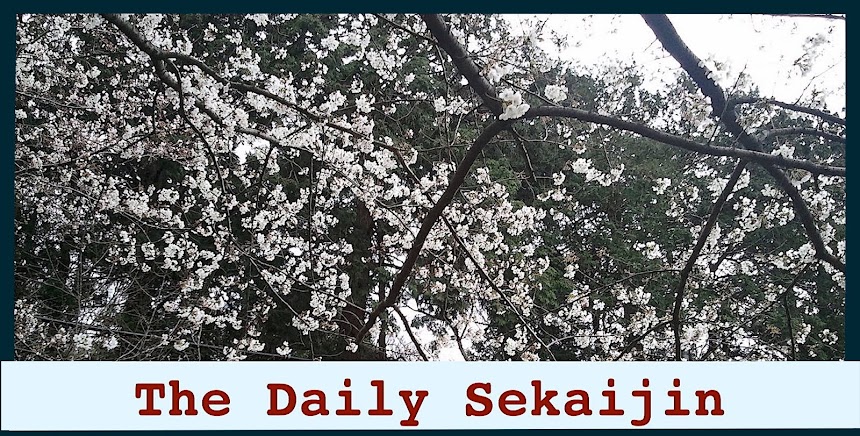Hello!
How are you? Here is
Part 1 of some answers to your question on your pre-teaching surveys. I hope I can answer these great questions of yours well!
To begin with, some of you asked me this question:
how long have you lived in Japan?
I have lived here for 18 years - first, in Ibaraki for seven years (Tsuchiura and Tsukuba Science City), then in Kashiwa in Chiba for three years, and since 2007, in Tokyo, in Nerima-ku (between Shakujiikouen and Takanodai).
Here are some more questions:
Why did you decide to live in Japan?
Because I had been here before - in the U.S. Navy (
海軍), from 1981 to 1983, on the base in Yokosuka. (The picture at the top is from an old passport picture of me when I was in the Navy. I was 21 years old in this picture.)
I really liked it here, and I said to myself that if I ever had the chance to come back here after the Navy, I would. In 1997 I had the chance, so I came back, and I have stayed ever since! My impression of this country is that it is an easy and safe place to live, with great food, great sights, and great transportation. Another person asked a related question about what the charm of Japan is, and I think it's this - the easy living and things in the culture and society that are nuanced, convenient, and that make life comfortable here.
The same person also asked me what the difference is between where I come from in the U.S., in Idaho, and Japan. Well - Tokyo, where I now live, is very different! But Idaho is not so different, I think, from a place like Hokkaido, or the Tohoku, or perhaps the northern part of the Kanto like Tochigi or Gunma. It has beautiful scenery, with mountains and forests, but also desert (
砂漠) just south of my hometown, Boise, which is the largest city and is the state capital (
首都) of Idaho.
Here are some pictures of Boise. Here is downtown Boise, right near the city center:
Boise has a nickname - the "City of Trees," because it has so many parks. It is beautiful around this time of year - October is very nice in my hometown! This is a typical fall shot looking towards downtown Boise:
This is downtown Boise in winter:
Finally, here's a night shot of downtown Boise:
Maybe Boise is a little like Yamagata, or even Sendai. This is a sightseeing spot in America - one even most Americans in the rest of the U.S. don't know!
The link for the Wikipedia article in Japanese about Boise is
here.
Two people asked this kind of question -
why do you work in Japan? Why as a college teacher?
Well, I think it's also because it's safe and easy to work here (and the money's good!). Working on the university level is also a great challenge with interesting classroom atmospheres and student dynamics, with great students like all of you! I got into university teaching because I knew a professor at Tsukuba University who really helped me a lot when I was working at my first job here - an eikaiwa school in Tsukuba. I still know him too - he's now at Chuo University, and through him I began to meet many other people who worked at universities, and I learned a lot from them too. Plus, I think a university is an exciting place to be at. So here I am at Seigakuin four days a week, and Daito Bunka University once a week on Wednesdays. I love it!
Some of you asked these ones:
what kind of Japanese food do you like? What's your favorite Japanese food?
I like so much here! There's very little I don't like.
My single favorite dish is
unagi. I love it! But of course, it's so expensive, and high in calories - not good for someone like me! I'm thin, but I have high cholesterol, so I have to be careful (I had unagi only once this summer. It was great!). When I go for sushi, one of my favorites, and one I have more than once, is
anago - of course, related to
unagi!
Look for more to come in Part 2 next week!




































